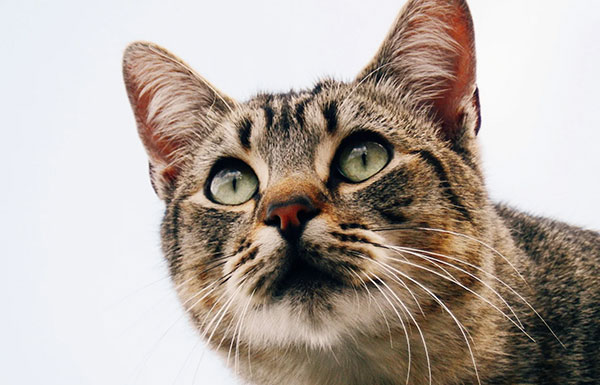Imagine this: you’re sitting on the sofa, and your cat suddenly freezes, staring at the wall as if it holds a secret. You follow their gaze, but there’s nothing there. That’s when the question creeps in: why do cats stare at walls? Sometimes it’s a harmless quirk that makes us smile, but other times, it could signal something more. As loving pet parents, we can’t help but worry when our companions behave in ways we don’t understand.
In this guide, we’ll uncover seven real reasons behind this behavior, from fascinating instincts to health concerns, so you can feel reassured and better connected to your feline friend.
1. They Hear Something You Can’t
Imagine sitting in a quiet room, and suddenly your furry friend freezes, eyes fixed on the wall. Their ears twitch, and they don’t blink. What’s happening? Cats have incredible hearing. While we only hear up to 23,000 Hz, they hear up to 64,000 Hz. That means even the faintest scratch of a mouse behind plaster or the hum of a pipe can catch their attention.
So, when you ask, “Why do cats stare at walls?” the answer could be simple: they’re tuned into sounds far beyond our range. Next time it happens, pause for a moment. Do you notice any faint noise in the room?
2. They See What We Miss
Cats don’t just hear better than we do, they also see things we can’t. Their vision picks up tiny movements, from a dust particle floating in a sunbeam to a tiny insect crawling along the wall. Sometimes, when we wonder “why do cats stare at nothing,” the truth is they’re watching something real, just too small or subtle for our eyes.
Picture this: your cat locked onto a moving speck of light, tail twitching in excitement. To you, it’s nothing. To them, it’s a grand hunt. It’s no surprise some people even ask, “Can cats see things we can’t?” In a way, yes, they absolutely can.
3. Feline Cognitive Dysfunction
As cats grow older, their brains change. Some may develop cognitive decline, often compared to dementia in humans. If your senior companion spends long minutes gazing at a wall, they may be confused or disoriented. Alongside wall staring, you might notice:
- Wandering aimlessly
- Sleeping at odd times
- Forgetting litter box habits
- Restlessness or loud meowing
These behaviours can feel heartbreaking to watch. If you notice them, speak with your vet. Early support can make your cat more comfortable, and it can help you feel less helpless as you care for them.
4. Curiosity at Work
We all know the saying about curiosity, and it fits perfectly here. Cats notice everything. Move a chair, replace a cushion, or bring in a shopping bag, and they’ll spot it. Sometimes staring at a wall is nothing more than your cat picking up on something new in their environment.
So, ask yourself: has anything changed near the spot they’re fixated on? A new smell, a shifted shadow, or even a mark on the paint can spark their attention.
5. Can Cats See Ghosts?
Here’s a thought many cat parents secretly entertain: do cats see ghosts? While there’s no science to prove it, countless stories suggest our pets sense what we can’t. Their eyes track invisible movements, their ears flick toward silence, and on some points, they act as if they’re watching an unseen presence.
Now, whether it’s a playful spirit or just light reflecting in ways we don’t notice, it makes us pause. And maybe that’s part of the magic of living with cats, their ability to keep us wondering.
6. Neurological Issues in Cats
At times, staring at a wall is linked to medical conditions. One example is feline hyperesthesia syndrome. Cats with this issue may suddenly freeze, groom excessively, or twitch their skin along their back. It can look like they’re zoning out on the wall, but in truth, their nervous system may be misfiring.
Neurological issues in cats, while rare, can be severe. Symptoms often include:
- Enlarged pupils
- Unusual vocalisation
- Sudden bursts of frantic grooming
- Skin rippling
If you notice these alongside wall staring, don’t wait. Book an appointment with your vet. You’ll feel reassured knowing you took action quickly.
7. They’re Simply Thinking
At times, the answer is quite simple. Cats pause, stare, and take a moment, much like we do when our minds wander. They might be planning their next jump, deciding whether to chase the toy, or just resting in thought.
So, when you ask “why do cats stare at walls?” keep in mind that they may simply be taking a quiet pause.
When Wall Staring Becomes a Concern
Most of the time, staring isn’t a concern. But if your cat presses their head against the wall and stays there, seek help immediately. This isn’t the same as affectionate head-butting. Head pressing can point to serious health issues like brain disease, infection, or poisoning.
Here’s what you can do right now:
- Observe closely: Watch for changes in behaviour, appetite, or movement.
- Check the spot: Is there a bug, noise, or reflection?
- Enrich their world: Toys, playtime, and safe spaces can ease boredom or stress.
- Call your vet: Trust your instincts. If something feels off, it’s always best to ask.
Final Thoughts
So, why do cats stare at walls? Sometimes it’s sound, sight, or curiosity. Other times, it may be health-related. Trust your gut, keep a close eye, and never hesitate to reach out for help.

https://shorturl.fm/yYwyc